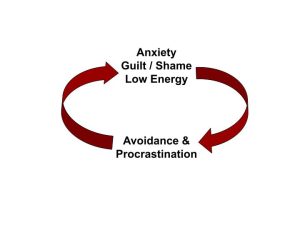6.4 Procrastination Leads to Procrastination: The Cycle
Procrastination can be cyclical, where procrastination leads to more procrastination. Consider the following scenarios:
- Alex has a research assignment due next week, and is feeling overwhelmed and anxious about the research and writing process. To avoid these feelings, they delay working on the assignment and watch several episodes of their favorite television series, which gives them a temporary feeling of relief and release from the stress. As the assignment deadline approaches, their stress level increases again, and their impulse is to delay the task to relieve their feelings of anxiety.

The Procrastination Cycle (Image source: Rothenberger Institute, 2018) - Abhi is almost out of food and needs to go grocery shopping, but he isn’t feeling the inspiration to leave the house and determines this isn’t the right time to go. He decides to focus on homework instead. Once his homework is done, Abhi decides it’s probably time to go to the store, but now he’s not in the right mood and thinks it’s best for him to wait until he feels better.
- Mariah tends to struggle with perfectionism. She has a fear of failure, and this fear leads her to procrastinate. When she procrastinates, Mariah becomes self-critical of her procrastination behaviors and her self-esteem suffers, leading to a loss of confidence. Her loss of confidence leads to an increased fear of failure, which perpetuates the procrastination cycle.
Self-Assess Your Understanding
- Explain the procrastination cycle.

